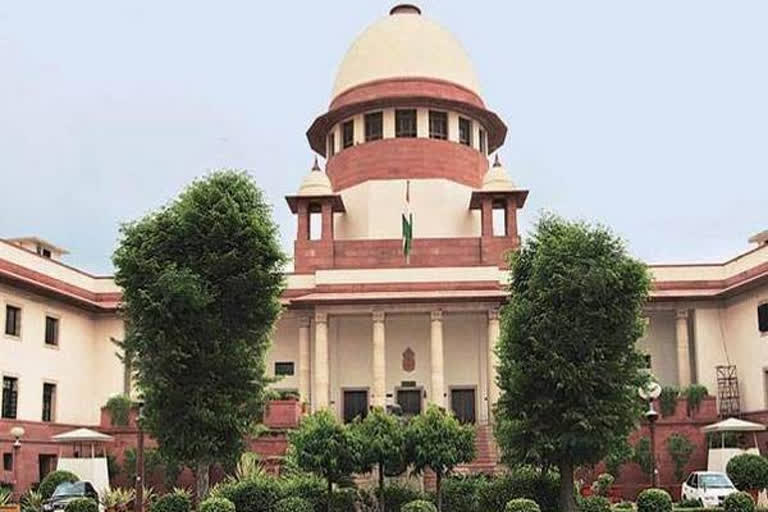New Delhi: The Supreme Court, while upholding the clean chit given by an SIT to then Gujarat chief minister Narendra Modi and 63 others in the 2002 riots cases, has noted the statement of TV anchor Sudhir Chaudhary about his purported interview with Modi.
Chaudhary, who is the Zee News Editor-in-Chief, was summoned by the apex court-appointed Special Investigation Team (SIT) and was specifically asked about the contents of a news report in which the then chief minister had allegedly referred to Newton's law that every action has an equal and opposite reaction. A bench headed by Justice A M Khanwilkar in his 452-page judgement noted, "Sudhir Chaudhary has stated that he attended a press conference held by Narendra Modi on March 1, 2002, at a Circuit House on the outskirts of Gandhinagar. He has further stated that Narendra Modi was known to him and that he had interviewed him earlier several times in Delhi.
"Sudhir Chaudhary has stated to have requested Narendra Modi for a short interview after the conference to which the latter agreed and as such he was interviewed for about 10 minutes," it said. "After going through the Editor's Guild Fact-Finding Mission report dated May 3, 2002, Chaudhary has stated that the same was only a few excerpts from the said interview and that the original CD of the said interview was not before him," the apex court noted.
Speaking to PTI, Chaudhary said he had quit Zee News by the time the SIT summoned him and the purported tape was recycled by that time. "The tape is not there with anyone. The SIT summoned me twice and I went to their Gandhinagar office. They asked me to confirm if Modi said that every action has a reaction and the entire riots were the reaction of Godhra which I denied.
"That time the UPA government tried to force me to give a statement that Modi said so. As far as little remembrance I have, he never said this. I am very happy that the Supreme Court has acknowledged and mentioned it in its judgement. Truth has prevailed," he said. "During that time, NGOs like that of Teesta Setalvad or some government officials and the Congress wanted to build an ecosystem trying to create a false narrative against Modi. To put pressure on me for this interview was also a part of it. Everything against Modi was based on hearsay. There was no evidence," Chaudhary added.
The top court also noted that as per Chaudhary's recollection, he had questioned Modi about the Chamanpura massacre (Gulberg Society Case), in which former Congress MP late Ehsan Jafri had been killed with many others to which the chief minister had replied that the mob had reacted on account of private firing done by Jafri. "After refreshing his memory from the Editor's Guild report, Sudhir Chaudhary has stated that the chief minister was of the view that he neither wanted action nor reaction.
He has further stated to have questioned the chief minister about the widespread violence post-Godhra, the Chief Minister stated as follows:-
"Godhra main jo parson hua, jahan par chalees (40) mahilaon aur bacchon ko zinda jala diya is main desh main aur videsh main sadma pahuchna swabhavik tha. Godhra ke is ilake ki criminal tendencies rahi hain. In logon ne pahele mahila teachers ka khoon kiya Aur ab yeh jaghanya apraadh kiya hai jiski pratikria ho rahi hai"," the judgment noted. It also took note of the fact that Chaudhary has shown his inability to elaborate the same as he has not been able to recollect the exact sequence of events after a span of nine years and moreover, the CD was not before him.
The top court mentioned in its judgement that Modi had been questioned by the SIT about the aforesaid interview given to Zee TV on March 1, 2002. "He (Modi) has stated that those who have read the history of Gujarat would definitely be aware that communal violence in Gujarat has a long history and the State had witnessed serious incidents of such communal violence. As regards the Zee TV interview of March 1, 2002, is concerned, Modi has stated that after a period of eight years, he did not recollect the exact words, but he had always appealed only and only for peace.
Regarding the statement made to the media about post-Godhra riots by citing Newton's law that every action has an equal and opposite reaction, Modi had stated that an English newspaper had published a news item on March 3, 2002, purportedly as though he had given an interview to them. "According to Modi, the truth is that nobody had met him in this regard. He further stated that the falsehood of his so-called justification 'Action-Reaction Theory' is evident from this fact. According to Modi, the State government issued a denial with regard to his not having given any interview and the same was belatedly published in a remote corner of the newspaper," the judgement noted.
The SIT's investigation was carried out in response to an observation made by advocate Raju Ramchandran, who was appointed as amicus curiae, who said that Modi's statement in a television interview on March 1, 2002, clearly indicates that there was an attempt to justify the violence against the minority community and this indicates as the certain approach. Ramchandran had observed that the statement made by Modi cannot be seen in isolation and detailed investigation is required.
Congress leader and former MP Ehsan Jafri was among the 68 people killed at Ahmedabad's Gulberg Society during violence on February 28, 2002, a day after the Godhra train burning that claimed 59 lives. The riots that it triggered killed 1,044 people, mostly Muslims. Giving details, the central government informed the Rajya Sabha in May 2005 that 254 Hindus and 790 Muslims were killed in the post-Godhra riots. (PTI)



